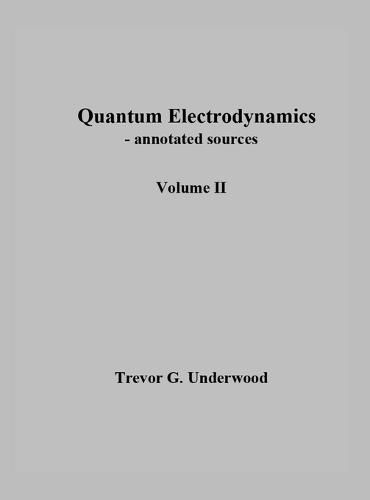Readings Newsletter
Become a Readings Member to make your shopping experience even easier.
Sign in or sign up for free!
You’re not far away from qualifying for FREE standard shipping within Australia
You’ve qualified for FREE standard shipping within Australia
The cart is loading…






This title is printed to order. This book may have been self-published. If so, we cannot guarantee the quality of the content. In the main most books will have gone through the editing process however some may not. We therefore suggest that you be aware of this before ordering this book. If in doubt check either the author or publisher’s details as we are unable to accept any returns unless they are faulty. Please contact us if you have any questions.
This is not a sourcebook in the conventional sense. It is a working document which brings together annotated extracts from 107 primary sources, or translations of them, of the development of quantum electrodynamics, so that it is easier for a researcher to deal with the large volume of material. Links to internet copies of the primary documents or alternative sources are provided where available to enable these to be consulted. A summary is provided at the head of each paper and in the Contents. The references in each paper are expanded to include the title (and its translation where relevant), and a copy of the summary where this is available and helpful to avoid unnecessary cross referencing. Biographies of the main contributors are also provided, of which 18 received Nobel Prizes in Physics. The chronological development of the theories of quantum mechanics and quantum electrodynamics constituted an interesting interplay between theory and experiment. Volume I, covering the period from 1896 to 1931 is primarily focused on the development of the largely successful non-relativistic theory of quantum mechanics and quantum electrodynamics. Volume II, covering the period from 1930 up until 1965, when Tomonaga, Feynman, and Schwinger received their Nobel prizes, addresses the attempts to formulate a relativistic quantum electrodynamics, or quantum field theory, for the electron, when the energy of the electron is relativistic, and in particular to address, through a process of renormalization, the still unresolved divergencies arising largely, if not entirely, from the assumption of a point electron.
$9.00 standard shipping within Australia
FREE standard shipping within Australia for orders over $100.00
Express & International shipping calculated at checkout
This title is printed to order. This book may have been self-published. If so, we cannot guarantee the quality of the content. In the main most books will have gone through the editing process however some may not. We therefore suggest that you be aware of this before ordering this book. If in doubt check either the author or publisher’s details as we are unable to accept any returns unless they are faulty. Please contact us if you have any questions.
This is not a sourcebook in the conventional sense. It is a working document which brings together annotated extracts from 107 primary sources, or translations of them, of the development of quantum electrodynamics, so that it is easier for a researcher to deal with the large volume of material. Links to internet copies of the primary documents or alternative sources are provided where available to enable these to be consulted. A summary is provided at the head of each paper and in the Contents. The references in each paper are expanded to include the title (and its translation where relevant), and a copy of the summary where this is available and helpful to avoid unnecessary cross referencing. Biographies of the main contributors are also provided, of which 18 received Nobel Prizes in Physics. The chronological development of the theories of quantum mechanics and quantum electrodynamics constituted an interesting interplay between theory and experiment. Volume I, covering the period from 1896 to 1931 is primarily focused on the development of the largely successful non-relativistic theory of quantum mechanics and quantum electrodynamics. Volume II, covering the period from 1930 up until 1965, when Tomonaga, Feynman, and Schwinger received their Nobel prizes, addresses the attempts to formulate a relativistic quantum electrodynamics, or quantum field theory, for the electron, when the energy of the electron is relativistic, and in particular to address, through a process of renormalization, the still unresolved divergencies arising largely, if not entirely, from the assumption of a point electron.